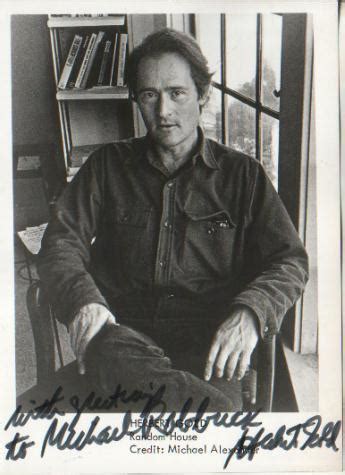A Quote by Arundhati Roy
It's OK just to be a writer, who writes about the society in which he lives and the issues that most important. Now how can that not be a writer, it always was. It's just recently that writers have been reduced to these playthings of the market.
Related Quotes
It feels as though a very disproportionate number of main characters are writers, because that's what the writer knows. Fair enough. But nothing bothers me more in a movie than an actor playing a writer, and you just know he's not a writer. Writers recognize other writers. Ethan Hawke is too hot to be a writer.
Oh, I love labels, as long as they are numerous. I'm an American writer. I'm a Nigerian writer. I'm a Nigerian American writer. I'm an African writer. I'm a Yoruba writer. I'm an African American writer. I'm a writer who's been strongly influenced by European precedents. I'm a writer who feels very close to literary practice in India - which I go to quite often - and to writers over there.
Of course I'm a black writer... I'm not just a black writer, but categories like black writer, woman writer and Latin American writer aren't marginal anymore. We have to acknowledge that the thing we call "literature" is more pluralistic now, just as society ought to be. The melting pot never worked. We ought to be able to accept on equal terms everybody from the Hasidim to Walter Lippmann, from the Rastafarians to Ralph Bunche.
That's one thing I like about Hollywood. The writer is there revealed in his ultimate corruption. He asks no praise, because his praise comes to him in the form of a salary check. In Hollywood the average writer is not young, not honest, not brave, and a bit overdressed. But he is darn good company, which book writers as a rule are not. He is better than what he writes. Most book writers are not as good.
Politics becomes a part of a writer's working life. The writer's protagonists are born in the context of the feelings that this atmosphere evokes. How can writers separate themselves from these feelings and create protagonists that come from Mars? Even writers who only write about psychological or internal issues or about love are writing under their prevailing atmosphere, and their writings will take on the hue of the time, place, and mood of their environment.
Most writers in Mexico have had posts as ambassadors, secretaries - that is no longer the case. Now a writer can live off writing. He has an audience: there are publishing houses, there are newspapers - so the situation is not as terrible as it used to be when there were no means and he had to go into government service, be an ambassador or a cabinet minister, etc. So, things are changing in the sense that the civil society is now the protagonist. The writer therefore occupies a different position, but no less influential than in the past, in a new, democratic society.
The people who review my books, generally, are kind of youngish culture writers who aspire to write books. When someone writes a book review, they obviously already self-identify as a writer. I mean, they are. They're writers, they're critics, and they're writing about a book about a writer who's a critic. So I think it's really hard for people to distance themselves from what they're criticizing.
I always ask young writers, 'Are you certain you want to be a writer? If you're absolutely sure, then do it.' If you really want to write, writing has to take precedence over everything else, except for taking care of your loved ones. It has to be more important than any possession, more important than fame. We hear about just a few writers who get famous, but most of them don't. It's got to mean more than that.
When I was thinking about these women characters, no matter how bad a person I am - a bad writer, my limitations, my sexism, you know - the thought was, it would be useful as a writer to try to create a template for all the male writers, especially Dominican male writers, especially males of color, of how a writer can use seeing to create more nuanced representations of women.
There's the fact that American fiction is basically the most apolitical fiction on the globe. A South American writer wouldn't dare think of writing a novel if it didn't allude to the system into which these people are orchestrated - or an Eastern European writer, or a Russian writer, or a Chinese writer. Only American writers are able to imagine that the government and the corporations - all of it - seem to have no effect whatsoever.





































